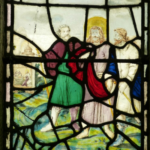Thank you for visiting. We trust that you have enjoyed reading our articles.
Confronting our Confrontations
“Anxiety weighs down the heart, but a kind word cheers it up” (Proverbs 12:25 NIV)

Our words will invariably hurt somebody’s feelings and cause pain. Proverbs 18:21 teaches us, “Death and life are in the power of the tongue.” Our words can be used to share the Good News with others or cause pain.
I think most of us try to avoid confrontations. They are unpleasant and awkward. However, sometimes it is important that we have a serious conversation or a “confrontation” with someone. It may be needed to resolve a lingering issue, to improve the relationship, and to better understand each other. Yes, sometimes we need to prune our relationships if they are not bearing good fruit. So, we must confront our reluctance to have a confrontation. Hopefully, at the end of the
confrontation the two people better understand and appreciate each other than before. When in a confrontation, I try to remember the words of Proverbs 15:1, “A gentle answer turns away wrath, but a harsh word stirs up anger.”
The purpose of the confrontation should not be to tear down the other person or get even. The purpose should be to try to identify common ground and should be done out of love and respect. Remember, one of the Fruits of the Spirit is self control.
Today, many of our confrontations become legal disputes. I understand that sometimes this is unavoidable, but we must realize the Word cautions us, “When you take another believer to court, you have lost the battle already” (1 Corinthians 6:7). The Apostle condemns the Corinthians because their tribunals were heathen, and the spirit of the litigation was void of Christ. The battle is lost because we have missed an opportunity to build up the Church. The Bible presents a better option that brings honor to God and both parties. “If your brother or sister sins, go and point out their fault, just between the two of you. If they listen to you, you have won them over. But if they will not listen, take one or two others along, so that ‘every matter may be established by the testimony of two or three witnesses.’ If they still refuse to listen, tell it to the church; and if they refuse to listen even to the church, treat them as you would a pagan or a tax collector” (Matthew 18:15-17).
The Bible tells us that unresolved conflict blocks our fellowship with God and keeps our prayers from being answered. This is why Jesus commands us in to restore our broken relationships before we worship (Matthew 5:23-24). Job’s friends reminded him, “To worry yourself to death with resentment would be a foolish, senseless thing to do,” (Job 5:2) and, “You are only hurting yourself with your anger,” (Job 18:4). It has often been said that when you forgive someone, the prisoner you set free is yourself.
I was taught years ago that if you were going to have a “come to Jesus meeting” with someone, it was best to begin and end on a positive note and insert your concerns in the middle. This lightens the tension at the beginning and ends the meeting on a positive note. A meaningful confrontation will convey three messages.
- You love and care for that person.
- You will pray for and help that person.
- You believe that person can change.
The Apostle Paul did this in 1 and 2 Corinthians by beginning and ending with affirmation. For example, Paul starts one letter by saying, “I always thank God for you,” and ends with, “My love to all of you in Christ Jesus.” Between that he’s dealing with some very tough truths while also giving affirmation in the middle: “I have great confidence in you, and I have a lot of reasons to be proud of you” (2 Corinthians 7:4). Paul wisely used the word “and” instead of “but.” The former maintains engagement but the later will make the listener defensive and invalidate your previous words of affirmation.
Prayer: Dear God: Please be with us during times of confrontation and help us use these occasions to speak words of truth in love that will bring honor and glory to you. Amen.
Meet the Author
Todd Shupe is a Men’s Ministry Specialist through the General Commission of United Methodist Men and is in training to be a Certified Lay Minister through the Louisiana Conference of the United Methodist Church. He currently serves as the President of the Baton Rouge District of United Methodist Men and is a Board Member for Gulf South Men and serves on the Action Team for The Kingdom Group. He is a volunteer for the Walk to Emmaus, Grace Camp, and Iron Sharpens Iron. Todd resides in Baton Rouge, Louisiana.
We welcome your comments below.
Liked this post?
Read more below or search for more topics...
-
Who Do People Say That the Son of Man is?
Who Do People Say That the Son of Man is? “Now when Jesus came into the district of Caesarea Philippi, He was asking His disciples, "Who do people say that the Son of Man is?" And they said, "Some say John the Baptist; and others, Elijah; but still others, Jeremiah, or one of the prophets." He said to them, "But who do you say that I am?" Simon Peter answered, "You are the Christ, the Son of the living God." And Jesus said to Him, "Blessed are you, Simon son of Jonah, because flesh and blood did not reveal this to you, but... -
The Walk to Emmaus: The Best Spiritual Weekend Retreat
The Walk to Emmaus: The Best Spiritual Weekend Retreat "When he was at the table with them, he took bread, gave thanks, broke it and began to give it to them. Then their eyes were opened and they recognized him, and he disappeared from their sight. They asked each other, “Were not our hearts burning within us while he talked with us on the road and opened the Scriptures to us?” (Luke 24:30-32 NIV). The Walk to Emmaus “Walk” is a three-day spiritual retreat that came out of the Roman Catholic Cursillo movement. The Walk to Emmaus is held numerous times during... -
Christian Leadership at Home
Christian Leadership at Home "Husbands, love your wives, just as Christ loved the church and gave himself up for her" (Ephesians 5:25 NIV). Men have been appointed by God as the head of the home. I understand that many women find this troubling and the Bible is full of stories of courageous women that have served the body of Christ. The truth is that many men have done a terrible job of leading their house in any capacity, particularly spiritually. Many men are not even physically present in the home or if so, they do not recognize Jesus as their Lord and...




